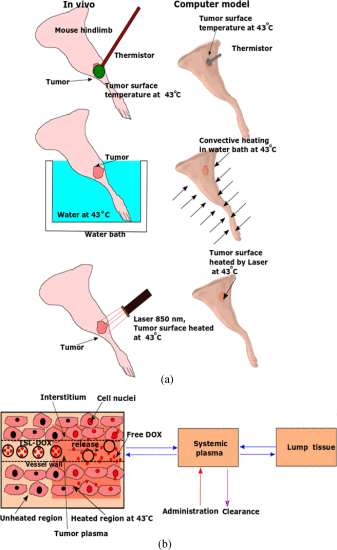
Goal: The impact of hyperthermia (HT) method on tumor drug uptake with thermosensitive liposomes (TSL) is not well understood. Methods: We created realistic three-dimensional (3-D) computer models that simulate TSL-encapsulated doxorubicin (TSL-DOX) delivery in mouse tumors with three HT methods (thermistor probe (T), laser (L) and water bath (WB), at 15 min and 60 min HT duration), with corroborating in vivo studies. Results: Average computer model-predicted tumor drug concentrations (μg/g) were 8.8(T, 15 min), 21.0(T, 60 min), 14.1(L, 15 min), 25.2(L, 60 min), 9.4(WB, 15 min), and 8.7(WB, 60 min). Tumor fluorescence was increased by 2.6 × (T) and 1.6 × (L) when HT duration was extended from 15 to 60 min (p < 0.05), with no increase for WB HT. Pharmacokinetic analysis confirmed that water bath HT causes rapid depletion of encapsulated TSL-DOX in systemic circulation due to the large heated tissue volume. Conclusions: Untargeted large volume HT causes poor tumor drug uptake from TSL.
